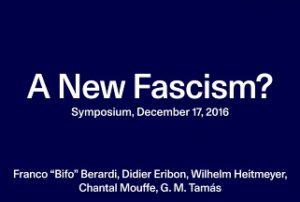Friedrichsplatz 18
34117 Kassel
 Franco “Bifo” Berardi, Didier Eribon, Wilhelm Heitmeyer, Chantal Mouffe, G. M. Tamás
Franco “Bifo” Berardi, Didier Eribon, Wilhelm Heitmeyer, Chantal Mouffe, G. M. Tamás
Anlässlich der Ausstellung von Loretta Fahrenholz veranstaltet das Fridericianum ein Symposium, das sich der Frage nach neuen Formen des Faschismus widmet. In ihrem Roman Nach Mitternacht (1937) schildert Irmgard Keun den Alltag im nationalsozialistischen Deutschland Ende der dreißiger Jahre. Angst, Kontrolle und Willkür beherrschen das Leben. In ihrer aktuellen Ausstellung im Fridericianum greift die Künstlerin Loretta Fahrenholz Parallelen zum aktuellen Zeitgeschehen auf: Frei nach Keuns Exilroman hat die Künstlerin mit Two A.M. einen soziofiktionalen Film gedreht, dessen Analogien mit der Gegenwärtigkeit von Überwachung, Kapitalismus und neu aufkommendem Faschismus erschreckend sind.
Eines der zentralen Merkmale der neuen Rechten, vom ungarischen Ministerpräsidenten bis zu Marine Le Pen, ist, dass sie ihrem Selbstverständnis nach allesamt Demokraten sind. Wenn man sie selbst sprechen hört, werden sie sogar jeden Tag demokratischer. Die AfD beruft sich, ohne zu erröten, auf eine Widerstandgruppe im dritten Reich: auf die „Weiße Rose“. Und die französische Front National verkündet stolz, dass sie die einzige Partei Frankreichs gewesen sei, die unter ihren Mitgliedern demokratisch über die europäische Verfassung habe abstimmen lassen. Tatsächlich hatten alle etablierten Parteien Frankreichs auf eine solche Abstimmung verzichtet, weil sie Angst vor einem die Europa-Verfassung ablehnenden Ergebnis hatten.
Man kann somit in der Undurchsichtigkeit der europäischen Institutionen einen der Gründe für das Aufkommen neurechter Bewegungen in allen Ländern Europas markieren. Ebenso, wie man die mit Sicherheit in der nächsten Zeit nicht abnehmenden Migrations- und Fluchtbewegungen als einen weiteren Grund für das Erstarken der neuen Rechten und nationalen Parteien benennen kann. Dabei muss man mit Zeev Sternhell feststellen, dass die faschistische Mentalität seit ihrem Beginn zu Anfang des 20. Jahrhunderts nie verschwunden war. Faschistische Strömungen waren immer mehr oder weniger sichtbar vorhanden. Sie treten aktuell wieder sichtbar und in neuem Gewand auf. Der Faschismus hat sich neu erfunden, wie Alain Badiou bereits vor über zehn Jahren anmerkte. Er hat neue Formen angenommen, die man analysieren muss, und dazu reichen die alten Faschismustheorien nicht mehr aus.
Das Symposium findet in englischer Sprache statt. Die Teilnahme ist frei.
Wir bitten um Anmeldung unter: symposium@fridericianum.org
10.30 – 13.00
Susanne Pfeffer
Introduction
Franco “Bifo” Berardi
Wilhelm Heitmeyer
Group-Focused Enmity, Social Disintegration and Right-Wing Populism in a Process of Escalation
14.00 – 16.00
Chantal Mouffe
The Populist Moment
G. M. Tamás
Fascism Without Fascism
16.30 – 19.00
Didier Eribon
What’s Next? Reflections on the Categories of Political Theory
Panel Discussion
Moderated by Gernot Kamecke
ENGLISH
Franco “Bifo” Berardi, Didier Eribon, Wilhelm Heitmeyer, Chantal Mouffe, G. M. Tamás
In conjunction with the exhibition Two A.M. by Loretta Fahrenholz, the Fridericianum is hosting a symposium devoted to an exposition of new forms of fascism. In her novel entitled Nach Mitternacht (After Midnight, 1937), Irmgard Keun describes everyday life in Nazi Germany in the late 1930s under the dominant influences of fear, government control and despotism. In her current exhibition at the Fridericianum, artist Loretta Fahrenholz calls attention to similar contemporary phenomena. Based loosely on Keun’s exile novel, her Two A.M. is a socio-fiction film in which she presents frightening analogies to present-day surveillance, capitalism and re-emerging fascism.
One of the essential characteristics of representatives of the new Right, from the Hungarian Prime Minister to Marine Le Pen, is that they all regard themselves as democrats. And when we listen to them, they seem to become more democratic every day. Without blushing, the AfD compares itself to the Third Reich resistance group known as the “Weiße Rose.” And the French Front National proudly points out that it was the only party in France whose members voted in a democratic referendum on the European constitution. All of the established parties in France had refused to take part in such a referendum for fear that the European constitution would ultimately be rejected.
Thus the obscurity of European institutions can surely be cited as one of the reasons for the emergence of new right-wing movements in all European countries. And the increasing popularity of the new right-wing and nationalist parties can also be attributed at least in part to the movements of migrants and refugees, which are certain to continue unabated in the foreseeable future. We must agree with Zeev Sternhell, who insists that the fascist mentality that emerged in the early twentieth century never really disappeared. Fascist currents have always existed in more or less visible form, and they are now reappearing in a new guise. Fascism has reinvented itself, as Alain Badiou pointed out ten years ago. It has assumed new forms which must be analyzed. And the old theories regarding Fascism are no longer adequate for that purpose.
All lectures will be in English. Admission is free – please rsvp to symposium@fridericianum.org
